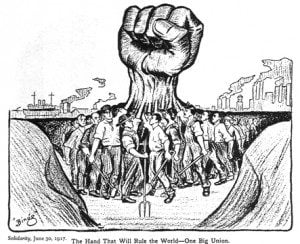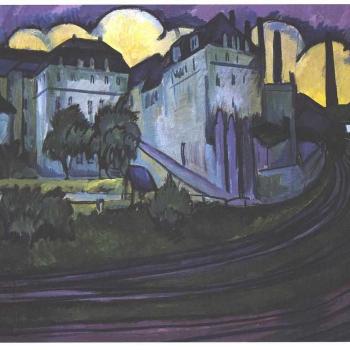
“Anarchy,” a scary word to many, doesn’t get much used in Catholic circles. It seems downright frightening, either theologically or personally—it seems to threaten longstanding traditions of justice, not to mention the personal comfort and status of the West’s largely comfortable and assimilated Catholic population. Witness, for example, the Catholic Encyclopedia:
The theory of anarchy is against all reason. Apart from the fact that it runs counter to some of the most cherished instincts of humanity, as, for instance, family life and love of country, it is evident that society without authority could not stand for a moment. Men whose only purpose would be to satisfy all their inclinations are by the very fact on the level of the animal creation. The methods they already employ in the prosecution of their designs show how the animal instincts quickly assert themselves.
Harsh words. Although the Encyclopedia is a useful resource in many ways, it was published in 1907, and, in some spots, is rather clearly a product of its time. I can say this, because, in spite of this absolute dismissal, anarchism became popular with not a few Catholic thinkers in the nineteenth and twentieth centuries. Fr. Thomas Hagerty, Peter Maurin, Dom Léonce Crenier, Dorothy Day, Emmanuel Mounier, Ammon Hennacy, (arguably) Simone Weil, Fr. Ivan Illich, and Fr. Dan Berrigan all come to mind, and that’s not even to mention famous examples from Orthodoxy and Protestantism such as Nikolai Berdyaev (along with Leo Tolstoy) and Jacques Ellul. Yet, unsurprisingly, the word continues to frighten us—comfortable as we are. In the interest of clarification, really of de-mystification, I’d like to ask: what is anarchism? And why did it appeal to so many Catholics?
First thing’s first then: “anarchism” refers to a good number of traditions with a variety of commitments. For my purposes here, the central distinction is between individualist forms of anarchism—à la Max Stirner, Benjamin Tucker, and, I would argue, Murray Rothbard (insofar as his ideas can be called by the “a word” at all)—and communitarian forms, often associated with Pierre-Joseph Proudhon, Mikhail Bakunin, and Peter Kropotkin.
The former looks something like an extreme form of what most Americans would call “libertarianism” (though often with a Left-wing inflection, that is, with a greater interest in the liberating force of anarchism, as opposed to a preservation or shrinking of existing institutions). Donald Rooum, an advocate of Stirnerian Anarchism, defines his views (and thus anarchism more generally) thus:
Anarchists believe that the point of society is to widen the choices of individuals. This is the axiom upon which the anarchist case is founded […]
Anarchists strive for a society which is as efficient as possible, that is a society which provides individuals with the widest possible range of individual choices.Any social relationship in which one party dominates another by the use of threats (explicit or tacit, real or delusory) restricts the choices of the dominated party. Occasional, temporary instances of coercion may be inevitable; but in the opinion of anarchists, established, institutionalised, coercive relationships are by no means inevitable. They are a social blight which everyone should try to eliminate.
Anarchism is opposed to states, armies, slavery, the wages system, the landlord system, prisons, monopoly capitalism, oligopoly capitalism, state capitalism, bureaucracy, meritocracy, theocracy, revolutionary governments, patriarchy, matriarchy, monarchy, oligarchy, protection rackets, intimidation by gangsters, and every other kind of coercive institution. In other words, anarchism opposes government in all its forms.
Note that this sounds not unlike a more radical form of American libertarianism, a fully liberated force for human decision-making with limited interest in sociality. Rooum’s formulation obviously comes from the Left-wing of the tradition (as do almost all forms of anarchism, again, with the possible exception of Rothbard’s Anarcho-Capitalism). The goal, in short, is the freedom of the individual from all forms of coercion: governmental, institutional, and socio-ideological.
The other tradition emphasizes mutual-aid, community-building, and social organization in the absence of the State (here understood in its particularly modern sense, something all-encompassing and subordinating, with, as a result of technological development, near global reach—especially when one factors in supra-state organizations like the EU and the UN). Proudhon, for example, had this to say about his thought:
All my economic ideas as developed over twenty-five years can be summed up in the words: agricultural-industrial federation. All my political ideas boil down to a similar formula: political federation or decentralization.
In another work, he’s a bit longer winded:
Power, instrument of the collective force, created in society to serve as mediator between capital and labor, has become inescapably enchained to capital and directed against the proletariat. No political reform can resolve this contradiction, since, according to the avowal of politicians themselves, such a reform could only end by giving more energy and expansion to power, and until it had overthrown the hierarchy and dissolved society, power would not be able to attack the prerogatives of monopoly. The problem consists, then, for the working classes, not in capturing, but in defeating both power and monopoly, which would mean to make rise from the bowels of the people, from the depths of labor, a power greater, an action more powerful which would envelop capital and the State and subjugate them.
Wayne Price updates the notion for today:
There was a vision, called “communism,” which was held by Kropotkin and other anarchist-communists in the 19th and early 20th century. Marx and Engels shared essentially the same goal. In the stateless, classless, society of communism, the means of production would be held in common (by the community), work would be carried out due to social motives rather than for wages, and consumer goods would be available to all according to their needs.
This division is the major one, though there exist various stripes within these. Some people in the communitarian category do not necessarily think the end goal is the communism in the sense intended by Marx; these people are often called “Mutualists,” but the point is clear enough: anarchism can have an individual or a communal inflection. The former seek the abolition of the modern State (and almost all, if not all, institutions) in the name of individual freedom, in the name of personal liberation. The others seek a stateless society, though one that itself would have mutually-beneficial and deeply-communal forms of social organization.
To drive the point home, how different these varieties are, here’s Max Stirner (an individualist anarchist) on Proudhon:
Proudhon, like the Communists, fights against egoism. Therefore they are continuations and consistent carryings-out of the Christian principle, the principle of love, of sacrifice for something general, something alien.
Americans, given our history and libertarian tendencies, are by-and-large, more familiar with the first sort. And that is a shame, since it’s had much less impact on Catholic thinkers.
But why has social or communitarian anarchism had such an influence on Catholicism? The first step in understanding this phenomenon is a recognition of the development of Christian Personalism in the twentieth century. Often associated with Jacques Maritain and even Pope St. John Paul II, personalism places particular emphasis on the richness of individual human consciousness, really individual human existence. It’s a complex term, defined in many ways, but for our purposes here, it might best be defined by the Encyclopædia Britannica:
Personalism, a school of philosophy, usually idealist, which asserts that the real is the personal, i.e., that the basic features of personality—consciousness, free self-determination, directedness toward ends, self-identity through time, and value retentiveness—make it the pattern of all reality. In the theistic form that it has often assumed, personalism has sometimes become specifically Christian, holding that not merely the person but the highest individual instance of personhood—Jesus Christ—is the pattern.
To be very reductive, personalism came to influence a variety of Catholic figures, including Maurin, Mounier, and Day. They sought to find a philosophy that rejected both the hyper-individualistic and atomistic accounts given by liberalism as well as the collectivizing tendencies of Marxist Communism (I would add here that, like many figures in the early- and mid-twentieth century, these figures often misunderstood all socialisms to be Marxist, that is Soviet. Many failed to recognize the diversity of Marxian thought, let alone socialist thought as a greater whole. I have written about the many branches of such traditions before).
Related to this personalist impulse was anarchism, another way of bridging the gap between social obligation and pure, unadulterated individualism. Anarchism could command both personal responsibility and communal commitment. Unlike right-libertarianism it did not only pay lip service to communal organization (i.e. it actually levied critiques at capitalism, the ultimate generator of consumerism, commercialism, individualism, etc. in the eyes of these men and women, that is, the ultimate source of institutionalized and cultural injustice) but actually theorized mutual aid, sociality, and commitment to community. On the other hand, it (in their eyes) unlike Soviet Marxism did not degrade the individual. As B. Jay Miller has written:
Mounier wrote the concluding essay of the issue. He began with the subject of the workers movement which had preoccupied Esprit during the past years. He argued that anarchism was the most important intellectual tradition for the movement in France. He praised Proudhon, Bakunin, and Kropotkin for their sensitive analyses of the ills of modern society and argued that they always proceeded from personal experience rather than “scientific” abstractions as did the Marxists. Mounier saw the anarchists as moralists, much in the same spirit as the personalists of Esprit. He praised anarchist federalism as a viable alternative to the tyranny of bourgeois and revolutionary statism. He argued that the anarchists cast a jaundiced eye on further centralization and specialization of industry; work had a personal meaning beyond its economic function. The anarchists preached a reign of abundance and spontaneous liberty, more a celebration of life than a rationalization.
But the link was not merely political. The anarchist belief in personal, but not private, property resonated with the Church Fathers, again signaling a path that respected both human dignity and human sociality. Again, Miller:
At this point Mounier compared Proudhon to the Fathers of the Catholic Church. They all agreed, so Mounier thought, that one could speak of property as theft in describing the private appropriation of riches from the communally produced superfluity of goods. In short, all goods beyond those satisfying personal needs should be subject to communal distribution; justice and charity demanded it. Proudhon and the Church Fathers knew that the health of the person and the community rested on such distribution.













